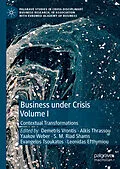This book examines businesses under crisis conditions through a composition of contextual accounts. The Editors argue that crises are transformative, evolutionary and even revolutionary in the development of organizations, industries and markets. Moreover, crises reform the context in which organizations operate, including customers and their behaviour. As such, they need to be viewed as conduits to change, accelerators of evolution and catalysts of innovation in organizations. Emphasising the importance of 'context' and its complexities, the book argues that for crisis, as a concept and notion, context is crucial to any understanding of the meaning that should or could be attached to it.
Bringing together scientific research and case studies on contextual transformations, the book provides a balanced selection of works across business disciplines, including management, strategy, marketing and finance as well as geographic regions, market types and industries. The book examines the context of crises, its indicators and triggers, and encompasses topics such as Artificial Intelligence, e-mobility, changes in consumption patterns, militancy and the impact of pandemics.
Demetris Vrontis is Professor and Vice Rector for Faculty and Research at the University of Nicosia in Cyprus.
Alkis Thrassou is Professor in the School of Business at the University of Nicosia, Cyprus, and a Senior Research Fellow of the EuroMed Academy of Business (EMAB).
Yaakov Weber is Professor and Director of the Research Unit, School of Business Administration, College of Management, Israel.
S. M. Riad Shams is Lecturer at the Newcastle Business School, Northumbria University, UK.
Evangelos Tsoukatos teaches Management at the University of Applied Sciences Crete, Greece, and is adjunct faculty at the University of Nicosia and the Hellenic Open University.
Leonidas Efthymiou is Assistant Professor in Hospitality and Management.Autorentext
Demetris Vrontis is Professor and Vice Rector for Faculty and Research at the University of Nicosia in Cyprus.
Alkis Thrassou is Professor in the School of Business at the University of Nicosia, Cyprus, and a Senior Research Fellow of the EuroMed Academy of Business (EMAB).
Yaakov Weber is Professor and Director of the Research Unit, School of Business Administration, College of Management, Israel.
S. M. Riad Shams is Lecturer at the Newcastle Business School, Northumbria University, UK.
Evangelos Tsoukatos teaches Management at the University of Applied Sciences Crete, Greece, and is adjunct faculty at the University of Nicosia and the Hellenic Open University.
Leonidas Efthymiou is Assistant Professor in Hospitality and Management at the University of Nicosia.Inhalt
Vol. 4i - Business Under Crisis: Contextual
Chapter Title & Authors
Chapter Description
Chapter 1
Editorial Introduction: The Anatomy of a Crisis
Demetris Vrontis (Ed.)
Alkis Thrassou (Ed.)
Yaakov Weber (Ed.)
Riad Shams (Ed.)
Evangelos Tsoukatos (Ed.)
Leonidas Efthymiou (Ed.)
In the first chapter, editors offer a contextual review of crisis, its indicators and triggers, while laying the conceptual foundations of the book. The chapter unpacks the concept of crisis to explain how individual specifics negates change and disturbances, bringing about a degree of disruption and instability. The chapter offers a framework through which it presents the subsequent chapters of the book.
Chapter 2
The routinizaton of crisis in marketing planning
Demetris Vrontis
(University of Nicosia, Cyprus)
Marketing is about agility and flexibility to shifting market dynamics, changing customer needs and competitive threats. However, while small shifts are easy, critical disruptive events, such as a pandemic, result to increased complexity. Solving marketing complexity is not simply about agility and flexibility. Rather, it is about complexity science. Relying on the latest ideas from behavioral economics, neuroscience, psychology, system dynamics, and network theory, this chapter suggests an adaptive Marketing Mix, within the framework of complexity science.
Chapter 3
Changes in consumption patterns of tourists after the COVID-19 pandemic
Mara Franco
(Universidade da Madeira / CiTUR Uma)
The focus of contemporary consumption patterns is on experiences. In the tourism industry, customers seek authentic experiences, guided by native people in local contexts. This chapter uncovers the changes in consumption patterns of tourists after the COVID-19 pandemic. It reports a major transformation in the consumption patterns of tourists, and calls for urgent managerial response to changing consumer behaviour.
Chapter 4
Losing your main trade partner
Luis Miguel Bolivar
(Universidad Tecnologica de Bolívar, Colombia)
This chapter delineates a very interesting phenomenon: the rise and fall of trade blocs, which disturb trade relations across the globe. Protectionism or political conflict often find companies and entire industries in the crossfire. Main trade partners are lost, trade barriers are raised, whereas, local industries are deprived of their suppliers and customers. Adaptation to destruction of trade barriers becomes imminent. A central example in the study is the broken trade relation between Colombia-Venezuela, which went from representing the 10% of their total trade to 0,7% in a 10-year period. A longitudinal social network analysis is used to depict the transformation of the countries' trade network and the facts that shaped the repose of manufacturing industries in Colombia. This contribution showcases the main adaptations that firms and industry...
